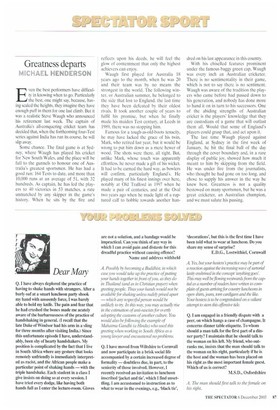Greatness departs
MICHAEL HENDERSON
Even the best performers have difficulty in knowing when to go. Particularly the best, one might say, because, having scaled the heights, they imagine they have enough puff in them for one last climb. But it was a realistic Steve Waugh who announced his retirement last week. The captain of Australia's all-conquering cricket team has decided that, when the forthcoming four-Test series against India has run its course, he will slip away.
Some chance. The final game is at Sydney, where Waugh has played his cricket for New South Wales, and the place will be full to the gunnels to honour one of Australia's greatest sportsmen. He has had a good run: 164 Tests to date, and more than 10,000 runs at an average of 51, with 32 hundreds. As captain, he has led the players to 40 victories in 53 matches, a rate unmatched by any skipper in the game's history. When he sits by the fire and reflects upon his deeds, he will feel the glow of contentment that only the highest achievers can enjoy.
Waugh first played for Australia 18 years ago to the month, when he was 20 and their team was by no means the strongest in the world. The following winter, or Australian summer, he belonged to the side that lost to England, the last time they have been defeated by their oldest rivals. It took another couple of years to fulfil his promise, but when he finally made his maiden Test century, at Leeds in 1989, there was no stopping him.
Famous for a tough-as-old-boots tenacity, he may have lacked the grace of his twin, Mark, who retired last year, but it would be wrong to put him down as a mere hewer of wood. The shots were there, all right. But, unlike Mark, whose touch was apparently effortless, he never made a gift of his wicket. It had to be earned the hard way, as bowlers will confirm, particularly England's. He played many of his finest innings over here, notably at Old Trafford in 1997 when he made a pair of centuries, and at the Oval two years ago when he made light of a ruptured calf to hobble towards another hun
dred on his last appearance in this country.
With his chiselled features prominent under the famous baggy green cap, Waugh was every inch an Australian cricketer. There is no sentimentality in their game, which is not to say there is no sentiment. Waugh was aware of the tradition the players who came before had passed down to his generation, and nobody has done more to hand it on in turn to his successors. One of the abiding strengths of Australian cricket is the players' knowledge that they are custodians of a game that will outlast them all. Would that some of England's players could grasp that, and act upon it.
The last time Waugh played against England, at Sydney in the first week of January, he hit the final ball of the day through the cover boundary and, in a rare display of public joy, showed how much it meant to him by skipping from the field. He was under fire from the journalists, who thought he had gone on too long, and chose to supply his answer in the way he knew best. Greatness is not a quality bestowed on many sportsmen, but he was a great cricketer, an Australian champion, and we must salute his passing.


























































































 Previous page
Previous page